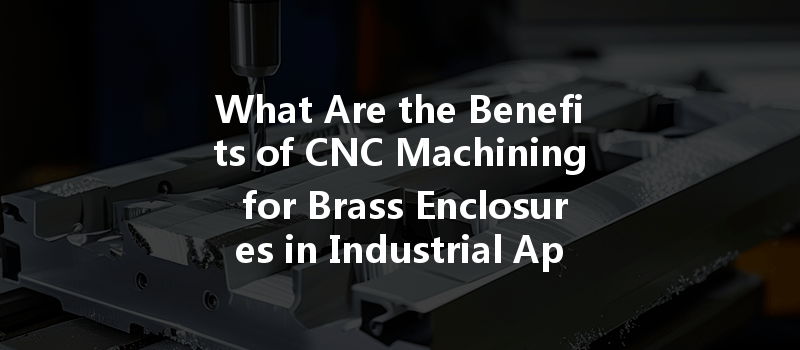: The Rise of CNC Machining in Industrial Manufacturing
Did you know that nearly 75% of manufacturers across various sectors have adopted CNC (Computer Numerical Control) machining for their production processes? In the ever-evolving landscape of industrial manufacturing, staying efficient, precise, and innovative is critical. One of the most notable applications of CNC technology is in the machining of brass enclosures, a process that has transformed how industries approach design and production.
This blog will explore the myriad benefits of CNC machining for brass enclosures, providing insights into its roles, efficiency, and the various design solutions that this technology brings to the table. Whether you’re a seasoned professional in the manufacturing field or just starting your journey into CNC machining, understanding these benefits will empower you to make informed decisions for your projects.
Understanding CNC Machining
Before diving into the specifics of CNC machining for brass enclosures, let’s establish a foundational understanding of what CNC machining entails.
Definition
CNC machining refers to the automated control of machining tools via a computer. It encompasses various processes including drilling, milling, turning, and more, utilizing pre-programmed software to dictate the movements of machinery. This automation allows for high precision, repeatability, and efficiency in creating complex parts.
How CNC Machining Works
Benefits of CNC Machining for Brass Enclosures
Brass enclosures play a vital role in various applications such as electronic housings, automotive parts, and decorative designs. Let us explore the benefits of using CNC machining for crafting these components.
One of the most significant advantages of CNC machining is its ability to deliver high precision and accuracy. This is particularly crucial for brass enclosures, which often require tight tolerances to ensure parts fit correctly within their designated spaces.
Modern CNC machines can create advanced geometries that are often challenging to achieve through traditional machining methods.
In an age where cost control is paramount, CNC machining for brass enclosures can substantially reduce production costs.
Speed is of the essence in today’s market, and CNC machining has excelled in this respect.
CNC machining offers a level of flexibility that is invaluable for modern manufacturing needs.

Quality assurance is an essential aspect of manufacturing, especially when dealing with critical components such as enclosures.
Applications of CNC Machining in Brass Enclosure Manufacturing
The benefits of CNC machining for brass enclosures can be seen across various sectors:
Electronics Industry
In the electronics sector, brass enclosures protect sensitive components from environmental factors. They require intricate designs with specific cutouts for ports and connections. CNC machining allows for precise fitting while ensuring adequate shielding and heat dissipation.
Automotive Industry
Automotive applications often require brass components for their excellent conductivity and resistance to corrosion. CNC machining can quickly produce these parts in high volumes while ensuring that each piece meets stringent safety and functionality standards.
Aerospace Sector
Safety and weight limitations are critical in aerospace, and using brass enclosures that are precisely machined can provide the necessary durability while maintaining lighter weights. CNC machining can consistently deliver parts that meet aerospace specifications.
Decorative Elements
Brass is often employed in decorative applications due to its attractive appearance. CNC machining can carve intricate designs into brass parts, producing custom enclosures that fulfill both functional and aesthetic requirements.
Challenges and Solutions
While CNC machining for brass enclosures offers numerous benefits, it is important to also consider potential challenges and their solutions.
Material Selection Issues
Selecting the right brass alloy can considerably affect the end product’s performance. Not all brass alloys have the same mechanical properties, so understanding your application requirements is crucial.
Solution: Conduct thorough material testing, and collaborate closely with material suppliers to choose the suitable brass alloy for your specific application requirements.
Programming Complexity
As designs become more intricate, programming CNC machines can become complicated, leading to potential errors.
Solution: Invest in skilled CNC programmers familiar with CAD and CAM (Computer-Aided Manufacturing) software. Ensure regular training to keep up with advancements in machining technology.
Initial Equipment Investment
The cost of CNC machinery and software can be high for smaller businesses.
Solution: Consider tiered investment strategies, such as leasing equipment or utilizing contract manufacturers that already have CNC capabilities until you can justify the investment.
Case Studies: Successful Implementations
Case Study 1: Electronics Company
An electronics manufacturer faced challenges in producing brass enclosures that accommodated multiple ports. After switching to CNC machining, they achieved a 30% reduction in production time and improved output quality.
Case Study 2: Automotive Parts Supplier
A supplier specializing in automotive components utilized CNC milling to produce brass enclosures with complex geometries. By implementing a multi-axis machining approach, they reduced their part costs by 25%, while significantly increasing their production capacity.
CNC machining has revolutionized the manufacturing landscape, particularly in the production of brass enclosures. Its remarkable advantages—precision, adaptability, rapid production, reduced costs, and enhanced quality—make it an essential process in contemporary industrial applications.
Understanding these benefits allows companies to leverage CNC machining effectively, leading to innovations in design and functionality. As you contemplate your manufacturing approaches and objectives, recognize that embracing CNC technology not only aligns with efficiency goals but also enhances the indicative quality of your products.
When considering your next project involving brass enclosures, reflect on how CNC machining can elevate your production standards and meet the demands of today’s competitive market. Investing in this technology could provide your business with a significant edge, helping you navigate successfully through the complexities of modern industrial manufacturing.






